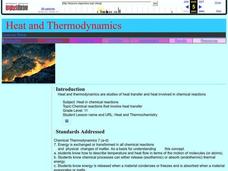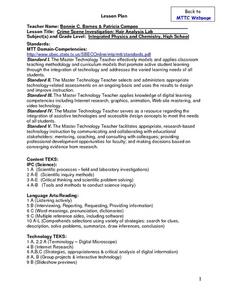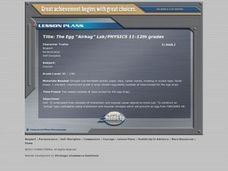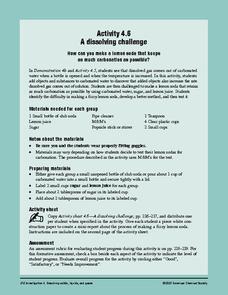Curated OER
Solar System
Students research the nine planets on the internet using the provided links. They also search for pictures of each of the nine planets and use these pictures to create a PowerPoint slideshow. Finally, they prsent their slideshow report...
Curated OER
Thermal Expansion and Sea Level Rise
Placing a thermometer and a glass tube into a flask of cold water and sealing it, you can expose it to heat and very visually demonstrate thermal expansion to your earth science class. Follow it with a discussion about how the increasing...
Curated OER
Heat and Thermodynamics
This is actually a 10-day mini unit on thermal energy for your high school chemists. Every avenue is taken to get learners absorbed in heat: a pretest, a PowerPoint presentation, Internet exploration, demonstrations, lab activities, and...
Curated OER
Chemical Resistance and Synthetic Polymers
Students participate in lab activities in which they examine immersion, stain resistance, and stress cracking of synthetic polymers. Students use their collected data to discuss service applications and possible performance of materials.
Curated OER
Changing Planet: Fading Corals
Show the six-minute video, "Changing Planet: Fading Corals," and then demonstrate how calcium carbonate forms a precipitate in the presence of carbon dioxide. Separate your scientists into small groups to gather information about coral...
Curated OER
Light and Elements
Here is a full-fledged investigation of light waves, the electromagnetic spectrum, and element spectra. Physicists research a scientist that contributed to our understanding of the behavior of light. They take notes on your lecture, and...
Carnegie Mellon University
Ocean Acidification
After brainstorming what they know about ocean acidification, youngsters place eggs in acid to determine the effects on calcium-containing organisms, and add carbon dioxide to solutions with sea shell material to discover the impact on pH.
University of Minnesota
Attention and Sensory Processing
Ever wondered how your brain manages all of the information it receives every second of every day? The sights, the sounds, the smells ... each one filed away for later use or moved to the front of the line so your body can react. Through...
Curated OER
Carbon Dioxide - Sources and Sinks
Where does all of the carbon dioxide come from that is supposedly leading to climate change? Earth science pupils test animal, plant, and fossil fuels as sources in this investigation. Using an indicator, BTB, they are able to detect the...
Google
Erosion?
What's the difference between wind erosion and water erosion? Perform an experiment to study the effects of air on soil, as well as water and soil, and how effective it can be to place rocks on the soil.
Curated OER
What's the Rub? It's All About Friction!
High schoolers determine the coefficient of friction for different surfaces. In this physics lesson plan, students identify the factors that affect friction. They collect data and write a formal lab report.
Curated OER
Old Wives' Tale or Helpful Hint?
In this scientific method learning exercise, students examine old wives' tales, conduct research, and design and experiment to test the tale.
Curated OER
Crime Scene Investigation: Hair Analysis Lab
Students participate in a hair analysis lab. Using a digital microscope, students compare and contrast hair samples. They determine if the hair samples are human or animal. After completing lab results sheets, students share their...
Curated OER
The Egg "Airbag" Lab
Learners use what they know about momentum and impulse to construct an effective "air bag" to protect an egg dropped from the top of the football stadium or other tall structure. They complete a final written report of their findings.
Curated OER
Soil Sample Lab 2
Young scholars examine each soil sample and record observations. In this biology instructional activity, students design an experiment to test soil flow rate. They write a lab report about the experiment.
Curated OER
Electrical Safety
Young scholars create a list of things that they do with electrical power. They then are shown a PowerPoint on "Basic Electrical Safety." Students evaluate electrical equipment, cords and situations for serviceability and safety...
Beauty and Joy of Computing
Nesting Lists
Create lists within lists. The second lab in a series of five in the unit has pupils develop a simple contact list app. The tasks within the lab build the need for an abstract data type. Individuals build more complexity into their...
Beauty and Joy of Computing
Unsolvable and Undecidable Problems
Try as you might, some functions just cannot be computed. The lab introduces the class to the possibility of unsolvable problems. The fourth lesson in a series of seven begins with a logic problem, then progresses to looking at functions...
Curated OER
Call Me Bond, Hydrogen Bond
As amazing as James Bond is, the surface tension of water does not allow him to walk on it! In this series of little lab activities, physical scientists play with the properties of water due to the hydrogen bonds and resulting polarity....
CK-12 Foundation
Mineral Formation: Evaporating Lake
Get crazy for crystals! Junior geologists learn the secrets of crystal formation through lecture, reading, and examples. Other topics include common ionic compounds found in fresh and salt water, the effects of location on forming...
CK-12 Foundation
Seasons: Shadow Lengths
Before iPhones and calendars, how did humans determine the seasons of the year? Middle school scientists discover how to use shadows to determine the time of year in an enlightening interactive. Pupils manipulate the sun and examine the...
Curated OER
Antibiotic Resistance
Students using the scientific method, study bacteria as a covering surface of the earth in many forms. They discover that not all bacteria is bad and introduce the topic of antibiotic resistance. Science Fair expectations are addressed.
Curated OER
Riding on a Pendulum
A comprehensive resource gets fourth grade physical scientists making observations about the period of a pendulum and then applying knowledge to a playground swing. Through seven different stations, they will record observations and...
American Chemical Society
A Dissolving Challenge
After collecting carbon dioxide bubbles from a cup of club soda, learners attempt to make their own lemon soda while preventing the loss of carbonation. They do so by creating a syrup before mixing the substances into the club soda....
Other popular searches
- Simple Science Lab Report
- Science Lab Report Templates
- Science Lab Report Format
- Lab Reports in Science
- Writing Science Lab Reports
- Science Lab Report Form
- Science Lab Report Writing
- Generic Science Lab Report
- Science Lab Report Rubric
- Physical Science Lab Report

























